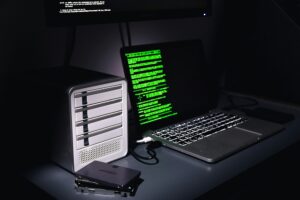National Internet Domain
Resolving disputes over the registration of national internet domain names (RS/СРБ) (hereinafter referred to as the “Domain“) arise when the holder of a registered trademark wishes to register a Domain that is identical or similar to their trademark, but a third party has already registered such a Domain.
Disputes may also arise when the use of a Domain violates intellectual property rights or other subjective rights of third parties.
In these situations, a conflict occurs between the Domain registrant and the trademark holder over the right to use the Domain.
Resolving Disputes Relating to the Registration of National Internet Domain Names
Parties can resolve such disputes through arbitration proceedings before the Dispute Resolution Commission established under the Serbian Chamber of Commerce (hereinafter referred to as the “Arbitration“).
The registrant accepts the jurisdiction of the Arbitration at the moment of Domain registration by agreeing to the General Terms and Conditions for registering national internet domain names.
The other party, disputing the Domain, agrees to the Arbitration’s jurisdiction by initiating arbitration proceedings, i.e., by filing a claim.
Arbitration Proceedings – Internet Domain
In arbitration proceedings, a decision may be made to terminate or transfer the registration of the disputed Domain from the registrant to the claimant if the following conditions are met:
- The Domain is identical to the claimant’s trademark or is so similar that it may cause confusion or deceive market participants.
- The registrant has no legitimate right or interest in using the disputed Domain.
- The registrant registered and used the Domain in bad faith and contrary to good business practices.
Legitimate Interest in Domain Use
The registrant will be considered to have a legitimate interest in using a Domain if they can prove:
- The Domain was used for commercial purposes in good faith and under good business practices, prior to any knowledge of a claim being filed.
- Before a claim was filed, the registrant was publicly recognized as the owner of the Domain, even if they had not registered the corresponding trademark.
- The Domain is used solely for non-commercial purposes, without any intent to deceive consumers or market participants regarding the origin of goods or services in a manner significantly similar to the claimant’s trademark.
Registration and Use in Bad Faith
A Domain will be considered registered or used in bad faith and contrary to good business practices in the following cases:
- If it is proven that the registrant primarily registered the Domain intending to sell or lease it to the claimant, the trademark owner, or their market competitor, with evidence of a significant disparity between the Domain’s registration cost and the price at which it is offered for sale.
- If it is proven that the registrant registered the Domain to prevent the trademark owner from registering their trademark as a Domain.
- If it is proven that the registrant registered the Domain to harm a market competitor.
- If it is proven that the registrant used the Domain—identical or significantly similar to the claimant’s trademark—primarily to attract internet users to a website or online service for commercial purposes, creating confusion about the origin of goods or services offered.
Declaration of Non-Infringement
When registering a Domain and agreeing to the General Terms and Conditions for Registration of National Internet Domain Names, the registrant declares that, to the best of their knowledge and sincere belief, the Domain name registration does not infringe on intellectual property rights or any other subjective rights of third parties.
This declaration implies that the registrant has verified, prior to registration, whether a trademark exists under the chosen name.
Finality of Arbitration Decisions
The Arbitration decision is final and cannot be appealed. In the case of a favorable decision for the claimant, the Domain registry will transfer the Domain from the registrant to the claimant unless the registrant provides evidence of initiating proceedings before a competent court.
Attorney at Law,
Stefan Mojsić

Registration in the Real Estate Cadastre: New Regulations and the e-Cadastre
Real estate transactions in Serbia, whether you are buying, selling, gifting or inheriting, consist of two formal steps: 1) Contract certification before a public notary

Law on Occupational Safety and Health – Applicable as of January 1, 2026
Amendments to the Law on Occupational Safety and Health (hereinafter: the Law), which entered into force on May 7, 2023, introduced a series of new

New Law on Information Security – what’s new?
The new Law on Information Security introduces significant changes and new protection measures – both for individuals and legal entities. Let’s take a look at

Distance selling and e-commerce: obligations of sellers and rights of consumers
Only a few years ago, an online store seemed like a novelty. Today, we order and shop “with a click,” pick up goods from parcel

Pledge over Aircraft in Serbia
Aircraft are, as a rule, objects of high value and are therefore very suitable as means of securing claims. Depending on whether the contracting parties

Aircraft Leasing under the Law of the Republic of Serbia and International Sources
Aircraft are essentially movable objects which, in legal transactions, enjoy the status of immovable property, and therefore aircraft leasing is a specific procedure.It is regulated


